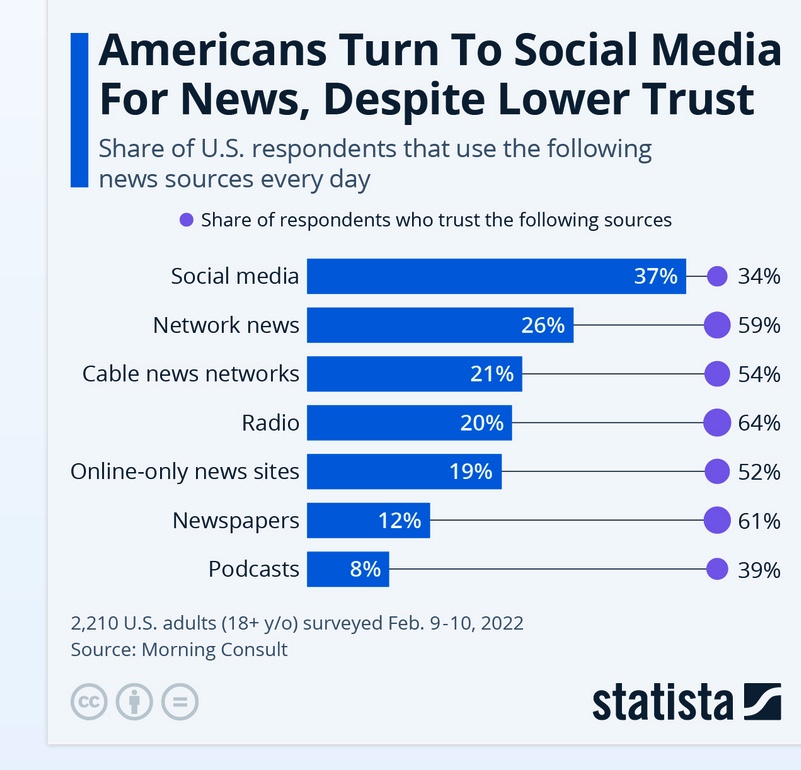Mainstream media (MSM) reports of the Israel/Hamas conflict are conflicting and erroneous making it difficult to believe them. If we could deprioritize MSM in our lives we might encourage peaceful resolution to world conflict. That will not be an easy task, but first, we have to understand what really MSM is. Our misunderstanding of the term is destroying relationships, society and the institutions that keep us from devolving into chaos. Let’s clear that up right now.
Social Media is mainstream
Simply put, MSM is social media. Pew Research and Gallup have shown for at least five years, most people get their news from digital devices. Of that group only a quarter go directly to a news website. The rest get it from a social media feed. Facebook is the leading source of news most people consume, followed by Youtube, X, TikTok, and a handful of other social media sites. That’s mainstream by any definition.
Most people will rattle off organizations like CNN, MSNBC, Fox News, The Wall Street Journal, New York Times, and Washington Post as MSM representatives. However, the combined audience of that group makes up about 10 percent of the population of the United States according to Gallup. That can hardly be identified as mainstream. A more accurate term is “legacy” media.

Finding content from legacy media is getting difficult in social media by design of the management of social media companies, while information from radicalized groups, hostile nation states, and paid political consultants currently makes up the bulk of information that these users call “news.”
Those who blame MSM for the disinformation and misinformation in the world are absolutely correct. However, they are ignoring sources of legitimate information in favor of the adulterated version.
Profit over truth
Mark Zuckerberg, Elon Musk, and Sundar Pichai profit from angry, ignorant audiences. They know this and they always have. Angry people are more amenable to advertising than a reasonable audiences, especially when the advertising is fraudulent. For a couple of decades, that triumvirate has slowly strangled the revenue of the legitimate news industry in favor of their own profits until now they realize that they can make more money by pushing false narratives.
While the Federal Trade Commission enforces laws requiring truth in advertising and punishing fraud, those laws are largely unenforceable outside of the United States. According to Facebook’s annual reports, only 43 percent of its advertising revenue comes from US companies. So legitimate news on Facebook and associated sites is not profitable for social media, while extremist posts fill their coffers. Google is under antitrust investigation for prioritizing paid search making it a less reliable source of information. Meanwhile, Musk has been much less subtle and has been banning journalists outright (this reporter included) on X.
In their defense, YouTube recently announced a change in the news tab and would push content from “authoritative” (read legacy) sources. But this, too, is profit-driven. YouTube’s viewership has flattened over the past few years with single-digit revenue growth. As with much of Alphabet, YouTube’s parent company, the lack of revenue growth is driving significant change as well as layoffs.
Facebook and X are seeing the same problem with revenue growth. Facebook revenue is projected to single-digit growth for the next five years. X, on the other hand, (checks notes) has seen a 55 percent decline in revenue year on year.
Not getting the memo
One might think that flat or declining revenue might make an entertainment-medium executive question content choices but Meta and X are still waving the flag of “free speech” to justify those choices. They push back on pressure from governments and watchdog organizations, like Nandini Jamma’s Check My Ads Institute, and find new ways to ignore regulations and public outrage.
While all this is going on in the business of MSM, as we define it here, the reliability of “citizen journalism” is coming into question, especially now in the Middle East .
Possibly the most egregious incident is the bombing of a hospital in Gaza City. Both Hamas and Israel have blamed the other and denied responsibility. At this point, the amount of misinformation that was produced within seconds of the incident made it almost impossible to find the truth apart from the uneducated positions. But that has been the latest, high-visibility incident is destroying public confidence in any system of information dissemination. That does not bode well for society.
It will only get worse
Harvard security and privacy expert Bruce Schneier said recently in an essay in The Conversation, “Disinformation campaigns in the AI era are likely to be much more sophisticated than they were in 2016. I believe the US needs to have efforts in place to fingerprint and identify AI-produced propaganda in Taiwan, where a presidential candidate claims a deepfake audio recording has defamed him, and other places. Otherwise, we’re not going to see them when they arrive here. Unfortunately, researchers are instead being targeted and harassed.”
We rely on information to make decisions. Without them, we can only react to external stimuli. Being dependent on the flight-or-fight instinct makes distrust in society the mainstream. Adversaries thrive on that instinct. That’s what fuels phishing and other social engineering attacks. Our diminishing ability to reason our way out of crisis creates additional crises. The San Francisco Bay Area is already seeing a reaction to the Israeli-Hamas conflict.
Frightened people
NBC Bay Area reported that gun shops are reporting a 25 percent increase in first-time gun buyers. Current gun owners are buying up ammunition inventories in these same shops. The concerns are driven primarily by social media reports about foreign wars, race-based assaults, and rampant rising violent crime, all of which are incorrectly reported by “citizen journalists.” Responsible information usually becomes available, at a minimum of 24 hours after the initial viral reporting, and occasionally validates the original report. In the case of the Gaza hospital bombing, it was almost exactly 24 hours before actual footage of the event became available showing that it was a car park outside the hospital that was hit. There was no evidence (shrapnel, craters, etc.) that would have come from conventional munitions, and the hospital building itself received only superficial damage.
Responsible citizens, in a perfect world, would stop doom scrolling on Facebook, X, and all other popular social media platforms and turn only to legacy media. At least then they would be getting the news a day late, but probably more accurately than from Elon Musk. This would make the world much safer, saner, and less stressful.



